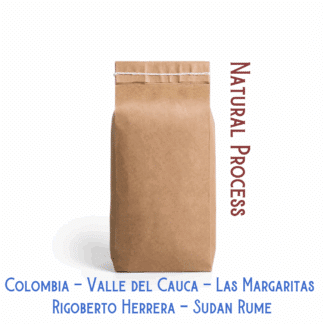Sudan Rume Coffee Las Margaritas
Price range: $53.00 through $600.00
This is an ultra-rare varietal with a flavor like no other coffee. We taste Black Cherry, Mint, and Dates. Yum!
Sudan Rume Coffee. Rume Sudan Coffee Variety. Colombian Risaralda Coffee.
Sudan Rume Coffee: A Flavor Like No Other
Certainly, this Sudan Rume bean is unique. It’s complex palate has an underlying sweetness. This compliments notes of herbs and spice in the cup. It has a rich base of fig and date. The beans have a rustic, banana-bready aroma especially when ground. There is a mint and cardamom profile in the aeropress brew. It gets candy sweet as it cools down.
Gentle blue florals like violet and lavender accompany hints of cinnamon in the V60 pour over. Espresso brews feature more ginger candy and punchy herbs than spice. Furthermore, a jammy body. What a treat. Every brew type was unique.
A subtle woody cedar flavor comes through in all of our tastings. This reminds us of Jamaican Blue Mountain and Kona beans. As a result, this coffee is a combo of sweet and savory. It has a wonderfully balanced acidity. We love the crisp, rich mouthfeel. Lots of flavor and structure.
We did some 4 cup Chemex brews with medium grind. Explicitly, this gave us sweet black cherry notes in the cup and a big body. It’s a unique coffee with a one-of-a-kind palate.
Potency in the finish always has us wanting to brew it again. We are using 80 TDS water by Aquacode in all our brews.
About the Dry/Natural Processing
This micro-lot is a traditional dry process coffee.
- Firstly, the cherries are picked at the optimal level of ripeness. A flotation process is carried out to remove the less dense cherries.
- Secondly, after measuring the Brix levels, the cherries are pre-fermented in open tanks for 48 hours to develop strong flavors.
- Finally, it is sun dried on raised patios for up to 30 days. The cherries are closely monitored and rotated regularly to ensure they remain clean and dry out evenly.
In conclusion, all these steps take a lot of time and attention to help stabilize the process and reduce defects. As a result, the premium quality and value of the brew is greatly improved. Most importantly, we appreciate the effort. It’s exciting to offer you a chance to try something new.
About Las Margaritas Sudan Rume
It all started in 1945 when the farm was acquired by current owner’s father, Juan Antonio. He was immediately interested in farming coffee varietals that are out of the ordinary. 60 years later, and the paterfamilias is now Rigoberto Herrera. He is one of the 14 children of Juan and his wife Blanca.
Working in the family business interested most of their children. Of the fourteen, two brothers were most engaged in the coffee farming. Rigoberto and Luis.
Firstly, their organization named Café Granja La Esperanza owned and operated the Potosi farm in Colombia. Secondly, they expanded production on a new plot of land in the Trujillo region. Thirdly, in 2008, in Boquete Panama, a coffee farm called “La Carleida” received first place in the “Best coffee of Panama” competition. The lease holder and manager of the farm was Don Rigoberto!
He was the first person to do it that was not from Panama. After just a year he had ranked at the very top of the Specialty Coffee Association of Panama organized event. He brought Geisha variety seeds back to Colombia from Panama after the big win. Café Granja La Esperanza would start a new era of experimentation and success.
Finally, the Café Granja La Esperanza umbrella acquired their most prolific property in Colombia. Las Margaritas in Valle del Cauca where this Sudan Rume Coffee is from. It’s there that they cultivate a kaleidoscope of uncommon and scarce cultivars that are expertly processed in a myriad of ways. Sidra, SL-28, and Laurina as well as others. They are known as one of the first farms to introduce Gesha to Colombia.
Sudan Rume coffee is Wild!



Rume Sudan Coffee Variety. Colombian Risaralda Coffee.
South Sudan’s Boma Plateau is just across the border from Ethiopia. It is home to this wild coffee variety with origins going back tens of thousands of years. Some believe maybe longer than that.
In his 1942 paper, A.S. Thomas described wild Arabica coffee growing on the slopes of Mt. Nelichu. He found it in the two localities of Barbuk and Rume. Consequently, three samples of the ancient arabica were left in storage at the international coffee collection at CATIE.
Risk and Reward
In general, this variety is mostly in use for hybridization. It can increase natural disease resistance. Mostly, it’s bred to prevent coffee cherry disease. Also, it can reduce the astringency of other varieties.
In the 1950’s, Scott Labs utilized Sudan Rume to parent famous Kenya varietals like SL-28. However, some farmers are growing it as a single origin because of the high quality and unique flavor.
Moreover, it is a risk to plant low yielding trees that might have a strange flavor. We commend Las Margaritas for taking the risk. Undoubtedly, it’s paid off. Indeed, the cup quality speaks for itself.
In 2021, a new genetic study shed light on the origins of arabica coffee. In addition, the genetic diversity of coffees from Sudan. It is possible that coffea arabica may have originated in Sudan before it existed in Ethiopia!
Sasa Sestic won the 2015 World Barista Championship with a Sudan Rume varietal. It brought this ultra rare coffee a lot of respect and attention as a single origin specialty coffee. In conclusion, this is a one-of-a-kind bean with a history that’s as unique as its taste in the cup.
For more awesome coffee check the Panama Geisha Coffee from Mil Cumbres!
If you have searched for las margaritas, you might find this interesting. If you searched for café granja la esperanza, this will be important to you. Check out the raw material. You may have also searhed for granja la esperanza. And you might have googled for las margaritas sudan rume variety.

